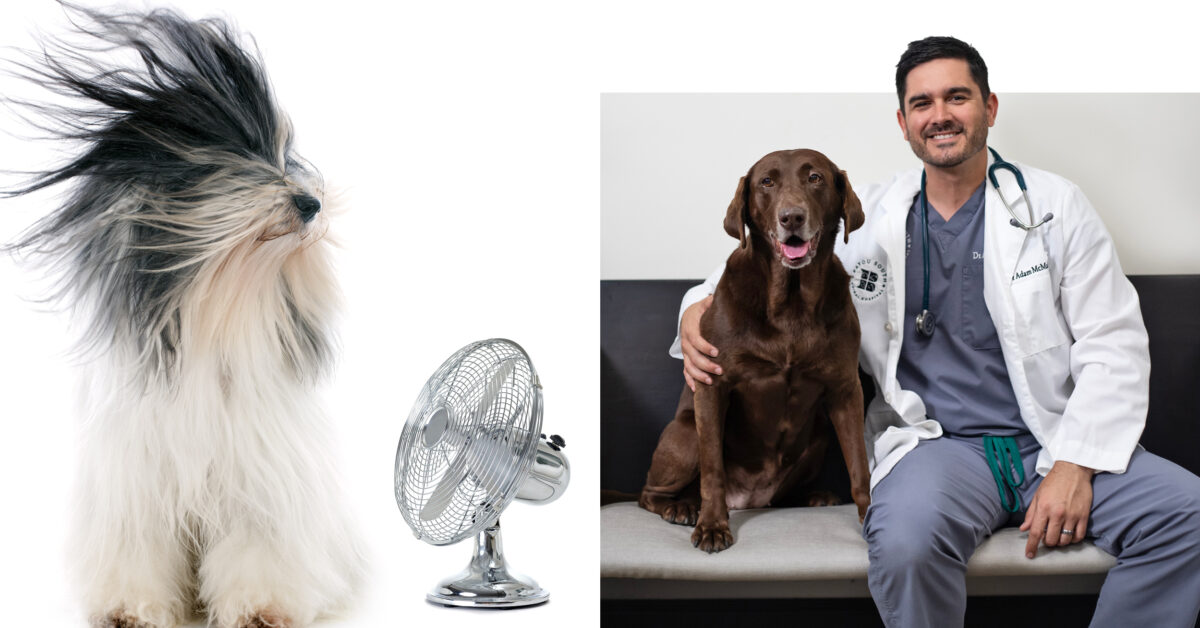
Summertime Boredom: Local Activities can Liven Your Life
July 2024
A Bit Brazen: A New Boutique on the Downtown Block
July 2024by Kristy Como Armand
The “dog days of summer” bring the hottest weather of the season. This period serves as a crucial reminder that pets are also susceptible to the Southwest Louisiana heat and humidity, facing an increased risk of heat stroke.
“Pets will naturally seek methods to cool off during hot weather,” says Dr. Adam McMahan, veterinarian and owner of Bayou South Animal Hospital. “If pets are housed outside, it’s important to provide them with resources such as shade and abundant water.”
Pets most susceptible to heat stroke include animals with shortened muzzles like bulldogs, pugs, or Persian cats; overweight pets; those with thicker coats; and pets with respiratory problems. Dr. McMahan adds that older animals are also at increased risk. “They are weaker and might experience an adverse response to increased temperatures more quickly than younger animals. The same goes for kittens and puppies who have not yet reached maturity.”
Heat stroke can also affect other pets, including rabbits, birds, guinea pigs, ferrets, and other small mammals. “Pet owners often think they can bring these pets outside to get some sun, but these pets can overheat and decline rapidly,” says Dr. McMahan. “The best place for them during the hot summer is indoors in the air conditioning.”
Recognizing the signs of heat exhaustion in pets is crucial. If your pet has been out in the heat and exhibits frantic breathing, a bright red tongue, lethargy, vomiting, or staggering, it may be suffering from heat stroke. In severe cases, your pet’s lips may turn pale blue or gray. If you notice any of these symptoms, Dr. McMahan advises moving the pet into the shade or indoors with air conditioning immediately. “Apply cool – not cold – water to your animal to gradually lower their body temperature and seek immediate veterinary care.”
Dr. McMahan offers these additional tips for keeping your pets safe in the summer heat:
• Provide access to shade at all times. If possible, keep them indoors during the hottest parts of the day.
• Supply fresh water. Keep the dish or water bottle out of direct sunlight. Adding ice to their water bowl can help keep it cooler for longer.
• Limit activity when temperatures are high. Walk dogs in the early morning or late evening when the sun is less intense and bring water for them.
• Use sunscreen. Pets can get sunburned too. Use sunscreen on sensitive skin areas, but ensure it is specifically labeled for use on dogs and cats to avoid harmful ingestion.
• Protect paws. Walk your dog on grass or dirt to avoid burning their paws on hot pavement.
Dr. McMahan emphasizes the most important rule: never, ever leave your pet in the car when temperatures are high, even with the windows open. “The No. 1 cause of heat stroke in dogs is being left in a hot car. The internal temperature of a car can quickly increase by 40 degrees or more above the outside air temperature, especially in direct sunlight. No pet owner should ever take this risk.”
If you suspect your pet is suffering from heat stroke or exhaustion, contact your veterinarian immediately.
For more information, call Bayou South Animal Hospital at (337) 480-1500 or visit www.bayousouthanimalhospital.com.






